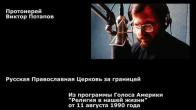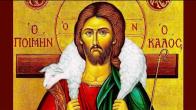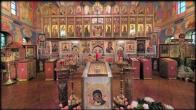You are here
Hieromartyr Alexander Parusnikov
14 / 27 June
 Hieromartyr Alexander was born in 1879 in Troitsko-Ramenskoe Village, located in the Bronnitsky District of Moscow Province. He was born into the family of Priest Sergei Paruskinkov, who served in the village’s Holy Trinity Church.
Hieromartyr Alexander was born in 1879 in Troitsko-Ramenskoe Village, located in the Bronnitsky District of Moscow Province. He was born into the family of Priest Sergei Paruskinkov, who served in the village’s Holy Trinity Church.
Alexander Sergeevitch, who did not plan to become a priest, enrolled in Moscow’s Technical College. One year before his course of study was to have been completed, his father told him that he was planning to retire, and asked his son to become a priest and take his place in the village church. Alexander Sergeevitch agreed, and after leaving the technical school, passed special entrance examinations for the seminary.
In Ramenskoye, he met his future wife, Alexandra Ivanovna Pushkareva. She was a graduate of the St. Philaret Diocesan School in Moscow, and was hired as a grade school teacher at a village school not far from Ramenskoye.
A factory director happened to invite Alexandra Ivanovna to a Christmas Ball held in one of the schools in Ramenskoye. There Alexander Sergeevitch met her. Finding her attractive, he hurried to ask her mother for her hand in marriage. The marriage was a harmonious one, and Alexander Sergeevitch and Alexandra Ivanovna had ten children.
In 1908, Alexander Sergeevitch was ordained to the priesthood and assigned to the Holy Trinity Church, where he served until his martyrdom. At the same time, he taught the Law of God in the Grosset School, a private school in Ramenskoye.
His parishioners came to love Fr. Alexander for his kindness and his willingness to respond to their needs; he never refused anyone who requested a service, and he gained general respect for not being avaricious.
When, with the coming of the Soviet Regime, there also began persecution of the Russian Orthodox Church, life became especially difficult for the priest and his family. Were it not for the help of his parishioners, it would have been difficult for them to survive. During this period, all of the members of the family were “persons deprived of rights”; deprived of food ration cards, they found all government stores closed to them. Private stores were few and far between, and everything sold by them was expensive.
Here is a vignette from those years: It was the Sochel’nik before the Nativity of Christ; the following day was the Great Feast, and there was nothing in the house, not even bread. Alexandra Ivanovna was sitting mournfully at an empty table. Father Alexander was preparing to go to church to serve the Vigil Service. He opened the front door and shouted, “Mother, Mother, come here!” She went out and saw that on the porch were two sacks filled with bread, grain, and potatoes. Fr. Alexander said to his wife, “And here is your feast.”
(…) In the late 1920s Fr. Alexander’s apartment was taken from him, and given as a residence to Mikhalenko, head of the local militia. His son worked for the NKVD in Moscow, on Lubyanka Square. Mikhalenko himself had active tuberculosis which was later to bring on his death... It was his practice to go about the house, especially to the apartment where the priest’s family lived, and spit. Often, Alexandra Ivanovna would get on her knees and beg him not to do that, saying, “We are guilty, but please spare the children.” He would respond, “Priestly scum should drop dead…”
Soon one of the priest’s sons fell sick with tuberculosis, then another, then a daughter, then a second daughter.
After that, a year would not go by without Alexandra Ivanovna escorting one of her children to the cemetery.
(…)In school, Fr. Alexander’s children were persecuted as children of a priest; there were constant reminders that they were not equal to the others. If they did not eat something at home, they would stay hungry all day at school. The school administration would feed the other children, but during those meals they had to sit at a separate bench off to the side, as children of a priest and persons deprived of rights.
Another common occurrence in those years: as Fr. Alexander would walk along the street, hand in hand with his daughter, people coming the other way would turn and spit at the priest’s back. His daughter would tightly grip his hand, and think, “But Lord, he is the best of all!” Sensing what the daughter was suffering at that moment, would say, “Never mind, little Tanya, it is all going into our till.” Like many other families, the priest’s family kept a milk cow. It happened that a government official led the cow away. At the time, Fr. Alexander was in church. Returning home, he saw that his family was extremely troubled and asked what had happened. Alexandra Ivanovna said,
“They have taken away our cow.”
“They have taken away the cow? Quickly now, all you children get on your knees. Let’s serve a Thanksgiving Moleben to St. Nicholas the Wonderworker.”
Confused, Alexandra Ivanovna looked at him and exclaimed, “Father?!”
“Sashenka, God gave and God took away. Let’s serve a Moleben of Thanksgiving.” Neither the Lord nor Holy Hierarch Nicholas abandoned the priest and his family. From then on, every day a basket would appear on their porch – with a bottle of milk and two loaves of bread. For a long time, the older children would keep watch at the window in an attempt to learn who was bringing them bread and milk. Sometimes they would watch late into the night, but they never managed to see their benefactor. This miracle of God’s help through the prayers of St. Nicholas continued for quite a long time.
Quite often, Fr. Alexander would be summoned by night to the NKVD. Sometimes, he would spend the entire night at the NKVD, and in the morning would go to serve at the church. His parishioners would have already despaired of seeing him at the service.
During the persecution of the Russian Orthodox Church in the late 1930s, all of the priests of Holy Trinity Church were arrested in turn. The last to be arrested, on March 24, 1938, was Fr. Alexander.
(…) The entire proceeding against Archpriest Alexander took place in the Ramenskoye Militia jail. One of the members of the militia was a man named Plotnikov. His assigned duties included taking the priest to his interrogations and to the bathhouse. The night before he was to take Fr. Alexander to the bath, he visited Alexandra Ivanovna late at night, and told her, “Tomorrow I am escorting your Batiushka. Come to the bridge and hide under it. I will bring him to you there.” Alexandra Ivanovna gathered together clean underwear and some food – taking into consideration that in the course of his trials, Fr. Alexander’s teeth had been knocked out. Fr. Alexander and Alexandra Ivanovna would sit under the bridge and talk until the militiaman approached and said, “Forgive me Batiushka, but it is already time to go.” They would say goodbye, Fr. Alexander would be led away, and Matushka would go home.
Fr. Alexander wrote several notes on cigarette papers that were later smuggled out in a boot heel by one of the released prisoners. The priest wrote to his children, wife, and son:
“My children, I kiss all of you and tightly press you to my heart. Love one another. Show reverence for your elders, and care for the young ones. Protect your mother with all your might. May God bless you.”
“Dear Sasha, thank you for the joy that you have given me.. Do not weep for me; it is God’s will.”
“My dear Seryozha, farewell. You are now taking my place. I ask you not to abandon your mother, and brothers, and sisters, and God will bless all you do with success. I will pine for you until I die. Once again, farewell.”
(…) On June 2, 1938, an NKVD troika [a three-man special tribunal] condemned Fr. Alexander to death. At the time he was in the Taganka Prison in Moscow. Archpriest Alexander was executed by firing squad on June 27, 1938, and was buried in an unmarked mass grave in the Butovo polygon near Moscow.
By a decision of October 6, 2001, another 36 Saints were added to the host of New Martyrs and Confessors. Among them was Hieromartyr Archpriest Alexander Parusnikov.
PARISH LIFE
Address of our Cathedral
Subscribe to our mailing list
While all the materials on this site are copyrighted, you may use them freely as long as you treat them
with respect and provide attribution on the Russian Orthodox Cathedral of St.John the Baptist of Washington DC.









